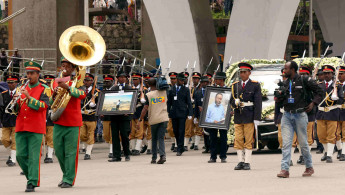Ethiopia buries slain architect of Grand Renaissance Dam
Ethiopia staged the funeral on Sunday of the chief engineer of a controversial project to dam the Blue Nile who was shot dead this week, state media reported.
There were tearful tributes to Simegnew Bekele, whose coffin was draped in an Ethiopian flag, at the Holy Trinity Cathedral in the capital Addis Ababa where hundreds of mourners gathered to pay their respects.
"Residents of Addis Ababa, his relatives and families, as well as senior government officials, including President Mulatu Teshome and Deputy Prime Minister Demeke Mekonnen (attended) the funeral ceremony," state-affiliated Fana Broadcasting Corporate reported.
Simegnew's body was found on Thursday in his car in Meskel Square in downtown Addis Ababa where police say he was shot in the right side of his head and a gun was found nearby.
Police are investigating the shooting but have not given any details, suggested a motive or announced any arrests.
On Sunday, thousands of people gathered in the square to pay their respects to the fallen engineer.
Twitter Post
|
Images posted on social media showed police firing tear gas after the crowd attempted to push past them to reach the funeral.
The $4-billion (3.2-billion-euros) Grand Renaissance Dam, being built near the country's western border with Sudan, will be Africa's largest when completed, producing 6,000 megawatts - roughly equivalent to six large nuclear reactors.
But the scheme has triggered tensions, primarily with Egypt, as Cairo fears that once commissioned the dam will reduce water supplies from the Nile to Egypt.
Talks over the Grand Renaissance Dam have been deadlocked for months, but leaders of the two countries on Sunday signalled they had made a breakthrough during a press conference in Cairo in June.
 |
| Click to enlarge |
Follow us on Twitter: @The_NewArab





 Follow the Middle East's top stories in English at The New Arab on Google News
Follow the Middle East's top stories in English at The New Arab on Google News
![Both Hamas and the Palestinian Authority welcomed the ICC arrest warrants [Getty]](/sites/default/files/styles/image_330x185/public/2024-11/GettyImages-2178351173.jpg?h=199d8c1f&itok=TV858iVg)

